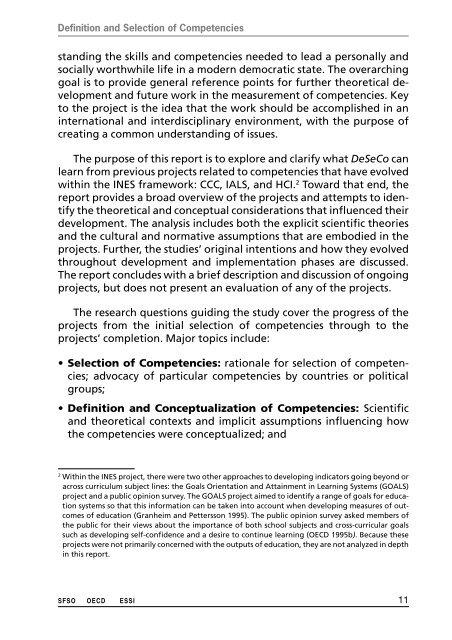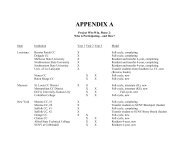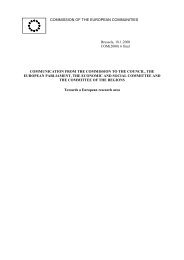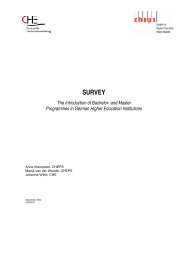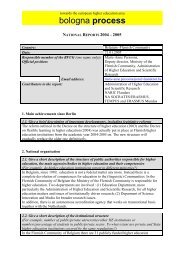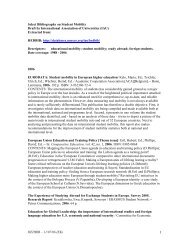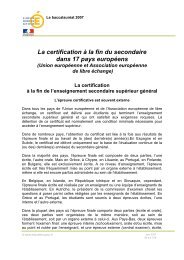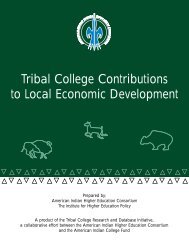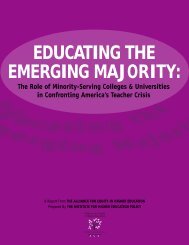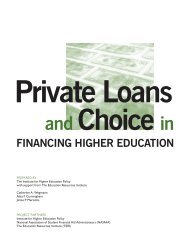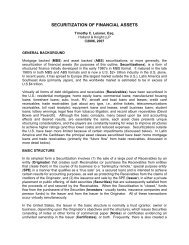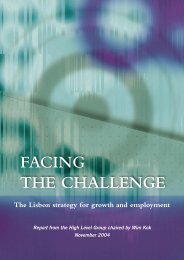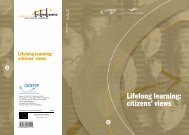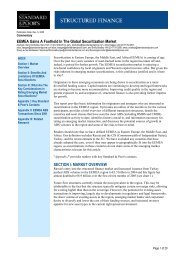Projects on Competencies in the OECD Context - Analysis - DeSeCo
Projects on Competencies in the OECD Context - Analysis - DeSeCo
Projects on Competencies in the OECD Context - Analysis - DeSeCo
You also want an ePaper? Increase the reach of your titles
YUMPU automatically turns print PDFs into web optimized ePapers that Google loves.
Def<strong>in</strong>iti<strong>on</strong> and Selecti<strong>on</strong> of <strong>Competencies</strong>stand<strong>in</strong>g <strong>the</strong> skills and competencies needed to lead a pers<strong>on</strong>ally andsocially worthwhile life <strong>in</strong> a modern democratic state. The overarch<strong>in</strong>ggoal is to provide general reference po<strong>in</strong>ts for fur<strong>the</strong>r <strong>the</strong>oretical developmentand future work <strong>in</strong> <strong>the</strong> measurement of competencies. Keyto <strong>the</strong> project is <strong>the</strong> idea that <strong>the</strong> work should be accomplished <strong>in</strong> an<strong>in</strong>ternati<strong>on</strong>al and <strong>in</strong>terdiscipl<strong>in</strong>ary envir<strong>on</strong>ment, with <strong>the</strong> purpose ofcreat<strong>in</strong>g a comm<strong>on</strong> understand<strong>in</strong>g of issues.The purpose of this report is to explore and clarify what <strong>DeSeCo</strong> canlearn from previous projects related to competencies that have evolvedwith<strong>in</strong> <strong>the</strong> INES framework: CCC, IALS, and HCI. 2 Toward that end, <strong>the</strong>report provides a broad overview of <strong>the</strong> projects and attempts to identify<strong>the</strong> <strong>the</strong>oretical and c<strong>on</strong>ceptual c<strong>on</strong>siderati<strong>on</strong>s that <strong>in</strong>fluenced <strong>the</strong>irdevelopment. The analysis <strong>in</strong>cludes both <strong>the</strong> explicit scientific <strong>the</strong>oriesand <strong>the</strong> cultural and normative assumpti<strong>on</strong>s that are embodied <strong>in</strong> <strong>the</strong>projects. Fur<strong>the</strong>r, <strong>the</strong> studies’ orig<strong>in</strong>al <strong>in</strong>tenti<strong>on</strong>s and how <strong>the</strong>y evolvedthroughout development and implementati<strong>on</strong> phases are discussed.The report c<strong>on</strong>cludes with a brief descripti<strong>on</strong> and discussi<strong>on</strong> of <strong>on</strong>go<strong>in</strong>gprojects, but does not present an evaluati<strong>on</strong> of any of <strong>the</strong> projects.The research questi<strong>on</strong>s guid<strong>in</strong>g <strong>the</strong> study cover <strong>the</strong> progress of <strong>the</strong>projects from <strong>the</strong> <strong>in</strong>itial selecti<strong>on</strong> of competencies through to <strong>the</strong>projects’ completi<strong>on</strong>. Major topics <strong>in</strong>clude:• Selecti<strong>on</strong> of <strong>Competencies</strong>: rati<strong>on</strong>ale for selecti<strong>on</strong> of competencies;advocacy of particular competencies by countries or politicalgroups;• Def<strong>in</strong>iti<strong>on</strong> and C<strong>on</strong>ceptualizati<strong>on</strong> of <strong>Competencies</strong>: Scientificand <strong>the</strong>oretical c<strong>on</strong>texts and implicit assumpti<strong>on</strong>s <strong>in</strong>fluenc<strong>in</strong>g how<strong>the</strong> competencies were c<strong>on</strong>ceptualized; and2With<strong>in</strong> <strong>the</strong> INES project, <strong>the</strong>re were two o<strong>the</strong>r approaches to develop<strong>in</strong>g <strong>in</strong>dicators go<strong>in</strong>g bey<strong>on</strong>d oracross curriculum subject l<strong>in</strong>es: <strong>the</strong> Goals Orientati<strong>on</strong> and Atta<strong>in</strong>ment <strong>in</strong> Learn<strong>in</strong>g Systems (GOALS)project and a public op<strong>in</strong>i<strong>on</strong> survey. The GOALS project aimed to identify a range of goals for educati<strong>on</strong>systems so that this <strong>in</strong>formati<strong>on</strong> can be taken <strong>in</strong>to account when develop<strong>in</strong>g measures of outcomesof educati<strong>on</strong> (Granheim and Petterss<strong>on</strong> 1995). The public op<strong>in</strong>i<strong>on</strong> survey asked members of<strong>the</strong> public for <strong>the</strong>ir views about <strong>the</strong> importance of both school subjects and cross-curricular goalssuch as develop<strong>in</strong>g self-c<strong>on</strong>fidence and a desire to c<strong>on</strong>t<strong>in</strong>ue learn<strong>in</strong>g (<strong>OECD</strong> 1995b). Because <strong>the</strong>seprojects were not primarily c<strong>on</strong>cerned with <strong>the</strong> outputs of educati<strong>on</strong>, <strong>the</strong>y are not analyzed <strong>in</strong> depth<strong>in</strong> this report.SFSO <strong>OECD</strong> ESSI 11


